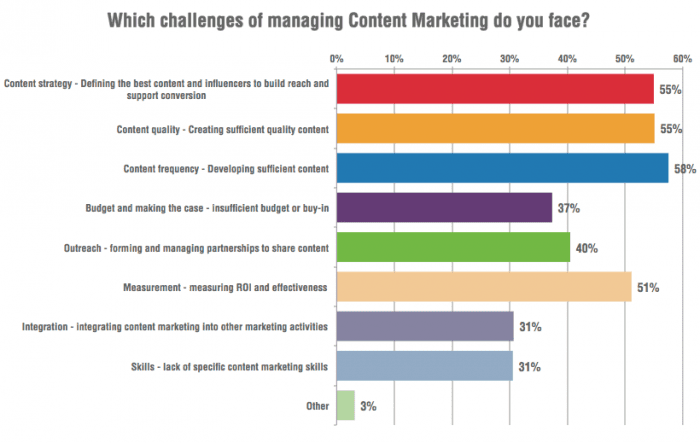Measuring the effectiveness of your Content Marketing Strategy
Our recent research with HubSpot on Competing on Content Marketing in 2015 identified that measurement of content marketing ROI was one of the main challenges of managing Content Marketing today - rated as a challenge by 51% of respondents.

Our Expert member guide on Measuring Content Marketing ROI by Stephen Bateman gives the full technical detail on how to calculate the profitability of content marketing using analytics. In this post, we share the advice of five content marketing specialists.
According to Daniel Rowles, from Target Internet, one of the greatest opportunities and advantages of content marketing is that we can create, deploy, measure and improve quickly and easily. Daniel explains that 'having well defined online objectives means that then our content marketing can be measured and ROI calculated relatively easily. The opportunities for test and learn are huge.'
More generally Daniel sees the key challenges of content marketing are around resourcing, but also sees a lack of strategic planning. Even though, this also means some of the challenges around resourcing can be addressed by making sure the resource we do have is used effectively and efficiently by doing more of what works.
He advises companies to 'adopt a well-defined strategic approach to content marketing where we are able to maximise where we spending our resources, be that time or otherwise, and get more for our budgets. Those organisations that develop content marketing within a measurement focussed strategy have the greatest chance of achieving their desired business objectives. An ad-hoc and scattered approach to content marketing will become increasingly unlikely to work as the market matures.'
Lee Odden CEO of Topline Online Marketing says that without confidence in the discipline, established best practices and a clear strategy to measurement, investing in content marketing would seem less favorable. Lee explains that 'most marketers want a sure thing or at least credible evidence of a successful return on investment.'
He explains that 'when clear goals, defined target audiences, efficient processes and measurable results can be demonstrated, then there's no reason not to invest in content marketing.'
According to European marketers are struggling to measure the ROI of their content marketing. 45% of European marketers' top challenges with content marketing are around measuring ROI and producing enough quality content.
Geraint Holliman, Director of Planning and Head of Content Marketing at the Direction Group says that most brands are applying the same measurement approaches to content marketing as they do to their other marketing activities. Since content marketing works in entirely different ways to traditional outbound marketing, many marketers need to wake up to the fact that using the same old measurement techniques is giving them very little chance of effectively measuring and justifying content marketing investment.
'Virtually nobody has considered what their content objectives should be, what their customers' unanswered questions are or what content would help customers make better decisions. The fact that 58% respondents recognise the value of a content marketing strategy (question 6) yet 56% don’t have a defined content marketing strategy confirms that most brands are still treating content marketing as a tactic and not an overall approach to engaging customers".
How do you measure your content effectiveness?
We all know there are many metrics to measure this. Annmarie Hanlon, Digital Marketing Strategist, Author and Trainer, recommends using Google Analytics or your analytics tool to show the volume of traffic completing an action, driven from your content sources. Gather an evidence base to convince the senior team.
She explains further that 'a lot of the problems marketers have are not just around getting the initial investment to make their content marketing dreams come true, but sustaining that initial support when results take time. It’s important to set the right expectations when pitching for your initial investment. Senior management teams are probably used to the timeframes of success they get from paid campaigns – or even the quick wins they had from SEO before the various Google updates of the past year.'
'The results from content take a little longer, plus everything you do with content won’t necessarily be successful. Keeping that support as marketers figure out how to make content work for their company is the difference between staying at that inconsistent level and moving towards having a more optimised strategy.'







